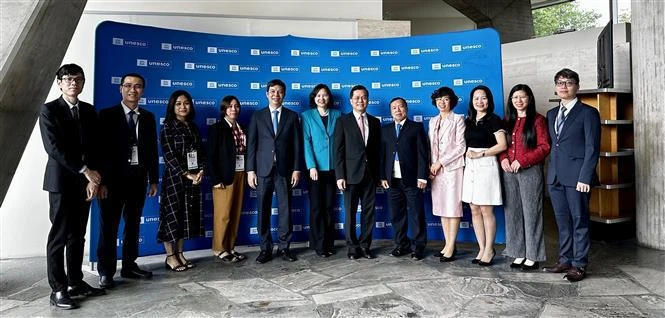 |
| Vietnamese Deputy Minister of Foreign Affairs and Chairman of the Vietnam National Commission for UNESCO Ha Kim Ngoc (middle) at the 10th session of the General Assembly of the 2003 Convention for the Safeguarding of the Intangible Cultural Heritage |
The 10th session of the General Assembly of the 2003 Convention for the Safeguarding of the Intangible Cultural Heritage opened on June 11 at the Headquarters of the UN Educational, Scientific and Cultural Organization (UNESCO) in Paris, featuring the participation of 183 member countries and more than 100 observers.
Deputy Minister of Foreign Affairs Ha Kim Ngoc, chairman of the Vietnam National Commission for UNESCO, led the Vietnamese delegation at the session and said that this appointment showed the nation’s rising international profile and the international community's trust in its ability to contribute to global institutions.
He therefore attributed Vietnamese success to the Party and State's sound foreign policy on diversification and multilateralisation of external ties, as well as its comprehensive global integration and cultural diplomacy initiatives, especially the Cultural Diplomacy Strategy to 2030.
In its role as Vice-Chair, the nation will play a key part in shaping UNESCO's cultural agenda and driving progress on the 2003 Convention. He also stressed Vietnamese commitments to leveraging UNESCO's programmes, as well as its plans and initiatives to support national development, heritage preservation, and in ensuring the highest national interests in global cultural co-operation.
The country boasts a rich tapestry of intangible cultural heritage, with 15 elements inscribed on the UNESCO Intangible Cultural Heritage List and 550 recognised nationally. Indeed, it continually fine-tunes national policies and laws, most recently the National Target Programme on Cultural Development to 2045 and the amended Cultural Heritage Law, Deputy Minister Ngoc affirmed.
In his opening speech at the session, the Vietnamese diplomat called for continued international co-operation and effective implementation of the Convention, underscoring the importance of knowledge sharing and capacity building for developing states, with a specific focus on empowering communities, women, and youth in heritage preservation efforts.
The General Assembly serves as the sovereign of the 2003 convention and acts as a platform for 183 member states to collaborate on safeguarding the world's living cultural traditions. Vietnam officially joined the 2003 Convention on September 5, 2005, thereby becoming one of the first 30 countries worldwide to adopt this important Convention. The nation has been elected twice to the Inter-Governmental Committee for the Safeguarding of Intangible Cultural Heritage.
The country is in the process of finalising and submitting several dossiers for UNESCO recognition, including the Yen Tu - Vinh Nghiem - Con Son, Kiep Bac relic and scenic complex; the Oc Eo-Ba The archaeological site, Con Moong Cave, the Ba Chua Xu Tem Festival at Sam Mountain, Dong Ho folk painting art, cheo stage art, Mo Muong, Lang Son Geopark, and notably a project aimed at preserving and promoting the values of the central sector of the Thang Long Imperial Citadel in Hanoi.